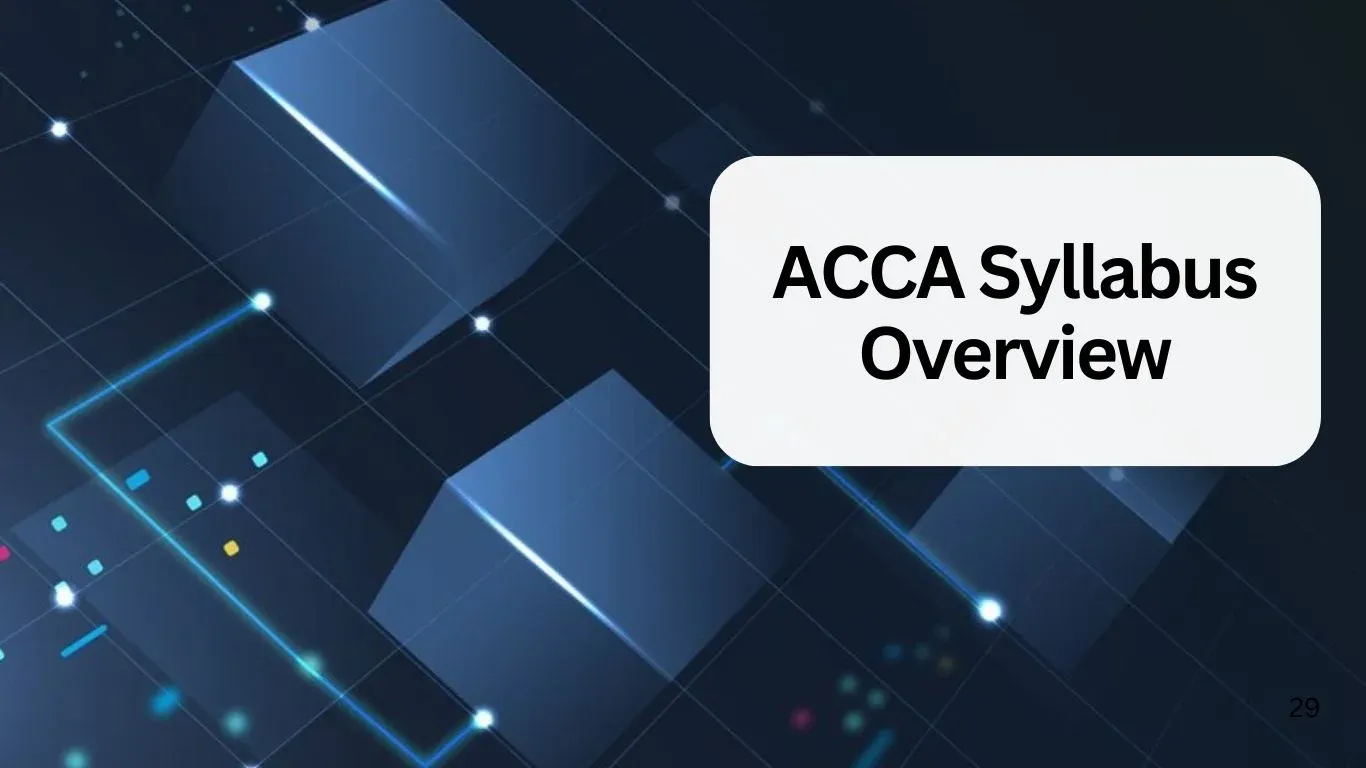What are the Different ACCA Subject Levels?
Updated: 29 December 2025, 2:47 pm IST
Summary
(This blog explains the structure of ACCA subject levels—Applied Knowledge, Applied Skills, and Strategic Professional. It outlines each stage's papers and objectives, helping students plan their ACCA journey. Whether you're starting or progressing, this guide provides clarity on what to study and how each level shapes your global finance career.)
The Association of Chartered Certified Accountants (ACCA) is a globally recognised professional accounting body that offers qualifications for individuals seeking a career in accounting, finance, and management. In India, ACCA-qualified professionals are in high demand and can pursue a variety of job opportunities in different fields, such as finance, accounting, auditing, taxation, consulting, and many others.
The ACCA qualification is structured into three levels: Applied Knowledge, Applied Skills, and Strategic Professional. Each level is designed to build upon the previous one. In this blog, we'll break down the ACCA syllabus in simple terms, providing a clear overview of each subject to help you navigate your ACCA journey with confidence.
Get Complete Details From Expert
ACCA Syllabus Overview

Here's a table summarizing the subjects at each level:
Level | Subject Code | Subject Name |
Applied Knowledge | BT | Business and Technology |
MA | Management Accounting | |
FA | Financial Accounting | |
Applied Skills | LW | Corporate and Business Law |
TX | Performance Management | |
FR | Taxation | |
AA | Financial Reporting | |
FM | Audit and Assurance | |
Strategic Professional | SBL | Financial Management |
SBR | Strategic Business Reporting | |
AFM | Advanced Financial Management | |
APM | Advanced Performance Management | |
ATX | Advanced Taxation | |
AAA | Advanced Audit and Assurance |
Applied Knowledge Level
This introductory level focuses on the fundamentals of accounting and business. It consists of three papers:
- Business and Technology (BT): This paper introduces students to the business environment and the influence of technology on business operations.
- Management Accounting (MA): Students learn about the principles of management accounting, including budgeting, forecasting, and performance measurement.
- Financial Accounting (FA): This paper covers the basics of financial accounting, including double-entry bookkeeping and the preparation of financial statements.
Strategic Professional Level

The final level focuses on strategic and advanced professional skills. It consists of four papers: two compulsory and two optional.
Compulsory Papers:
- Strategic Business Leader (SBL): This paper integrates technical, ethical, and professional skills, focusing on leadership and strategic management.
- Strategic Business Reporting (SBR): Students develop the skills to make strategic business decisions based on financial reporting.
Optional Papers (Choose Two):
- Advanced Financial Management (AFM): This paper covers advanced investment appraisal, corporate reconstruction, and risk management.
- Advanced Performance Management (APM): Students explore strategic management accounting techniques and performance evaluation.
- Advanced Taxation (ATX): This paper delves into complex tax issues and tax planning strategies.
- Advanced Audit and Assurance (AAA): Students learn about advanced audit and assurance engagements, including current issues and developments.
ACCA Course Eligibility
Once you've made the decision to pursue the course, it’s important to understand the ACCA course eligibility criteria and determine if you qualify. The requirements are outlined below:
The fundamental eligibility criteria for the ACCA course is to complete Class 12th with a minimum of 50% marks. You also need to achieve at least 65% in Accounts, English, and Mathematics. If you do not meet the aforementioned criteria, you will need to complete the foundation in ACCA diploma.
Career Prospect After Completing ACCA

Completing the ACCA qualification opens up a wide range of career opportunities in India. Some of the roles that ACCA-qualified professionals can pursue include:
- Financial Accountant: Responsible for preparing financial statements and ensuring compliance with accounting standards.
- Management Accountant: Focuses on budgeting, forecasting, and performance analysis to assist management in decision-making.
- Tax Accountant: Specializes in tax planning and compliance, making sure that organizations meet their tax obligations.
- Internal Auditor: Evaluates an organization's internal controls and risk management processes.
- External Auditor: Conducts audits of financial statements to provide assurance to stakeholders.
- Financial Analyst: Analyses financial data to provide insights and recommendations for business decisions.
- Investment Analyst: Evaluates investment opportunities and provides recommendations to investors.
- Treasury Analyst: Manages an organization's liquidity, investments, and financial risk.
ACCA Exemptions
ACCA exemptions refer to the waivers granted for certain examination papers. Exemptions are available for commerce graduates, post-graduates (M.Com), inter-CA students, and those who are CA qualified. Students who have just passed their Class 12th exams do not qualify based on this criteria, but they can still register for the exam through the Foundation in Accountancy (FIA) pathway.
Are you a graduate now and regret not enrolling in the course right after finishing Class 12th? No need to worry, as individuals with higher educational credentials are eligible for ACCA course exemptions. Let’s examine the exam exemptions available before you enroll in this course.
- Students who join the course immediately after Class 12th must take all the exams.
- However, commerce graduates who have completed their B.Com can receive up to 5 exemptions from their exams.
- Additionally, CA IPCC candidates can get exemptions from 5 exams.
- Many CA candidates today take on this course and are eligible for exemptions from 9 exams.
Qualification | Exemptions | Number of Exams to Appear for |
Class 12th Pass | NA | 13 Papers |
Commerce graduate | BT, MA, FA, LW | 9 Papers |
Commerce postgraduate | BT, MA, FA, LW | 9 Papers |
CA | BT- FM (please refer to the above table) | 4 papers |
CA IPCC (both groups) | BT, MA, FA, TX, AA | 8 papers |
- The candidate must have completed 5 subjects, including English and either Mathematics or Accounts, achieving at least 65% in those and over 50% in the others.
- A CA Final candidate may qualify for extra exemptions, contingent upon scoring 40 or higher in specific subjects during the examination.
Why Should You Pursue ACCA?

Why consider pursuing ACCA when there are numerous other accounting and finance programs available? Here are some compelling reasons:
Global Recognition
What makes ACCA so appealing that even CA candidates are opting for this course? A significant reason is its global recognition. ACCA is now offered in around 180 countries worldwide. After obtaining your ACCA qualification, you can either work in a multinational corporation in your own country or seek opportunities abroad.
Attractive Salary Package
With career progression, you can expect to receive a competitive salary. According to Glassdoor, an ACCA professional in India earns up to 14 lakhs annually. This salary tends to rise with experience and time.
Promising Career
Another vital reason to pursue ACCA is the potential for career advancement. Most multinational firms prefer to hire candidates with professional qualifications. ACCA candidates possess expertise in strategic skills, and their communication and leadership abilities make them highly sought after by various multinational companies.
Become Part of the ACCA Community
Finally, you will become part of a prestigious community. The association keeps ACCA members informed about the latest developments in the accounting field. Additionally, you can discuss and seek guidance on various queries you may have from fellow community members.
Take the next step in your career ?
Final Words
Embarking on the ACCA journey equips you with a solid foundation in finance and accounting, opening doors to diverse career opportunities globally. The comprehensive ACCA subjects ensure that you're well-prepared to tackle the challenges of the financial world. Moreover, the ACCA salary prospects in India are promising.
If you're looking to further enhance your qualifications, consider enrolling in Amity University's online B.Com in International Finance. This program is designed to complement your ACCA studies. It will provide you with a broader perspective on global finance and enhance your career prospects.
Check Out Our Top Online Degree Programs

